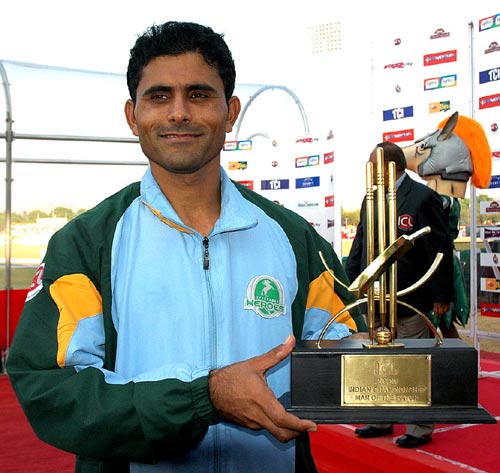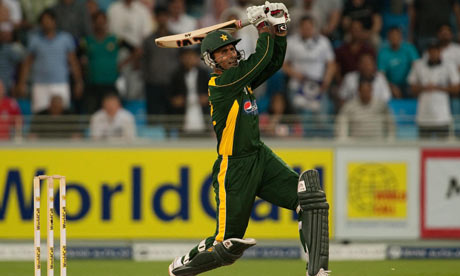Abdul Razzaq Biography
Abdul Razzaq is one of the best all-rounders of Pakistan who made his international debut in 1996 as a promising all-rounder. Initially recognised primarily for his skill with the ball, on occasion touching 90mph, his accuracy and ability to extract movement suggested he could become the mainstay of Pakistan’s Test bowling attack.Razzaq’s breakthrough year was 1999. He was one of the brightest young talents of the World Cup that year and a pivotal member of the Pakistan side that reached the final, picking up 13 wickets in the tournament whilst batting at number three, including a half-century against Australia. He was rewarded with a Test debut later in the year during Pakistan’s tour of Australia and in the next few years, up to 2002, established himself as a key member of the national side in all formats of the game.
In 2000, he was named Man of the Series in the Carlton and United Series between Pakistan, India and Australia for his performance with bat and ball. Razzaq scored a half-century and took five wickets against India and later on famously struck five consecutive fours in an over against Glenn McGrath. Also in 2000, Razzaq became the youngest bowler to take a Test hat-trick in a match against Sri Lanka. This was his second notable bowling feat against Sri Lanka, the first being the 5/31 he took to secure a tie an ODI match in Sharjah 12 months earlier.
The stage appeared to be set for Razzaq to develop into a world class all-rounder but over the course of the next couple of years his bowling regressed, the incisiveness of his earlier efforts diminished. Not one to refrain from speaking his mind, his complaints regarding the mismanagement of his career have been a persistent feature.
As his bowling was became less reliable, he continued to develop a reputation as one of the most devastating lower order hitters in one-day cricket. He has saved his best for South Africa – two of his three ODI centuries have come against the Proteas, including one of the great ODI innings. During the Abu Dhabi series in 2010, Razzaq entered the fray in in the 30th over with Pakistan languishing on 136/5 chasing 289. He ended with 109 not out off 72 balls, including 10 sixes. An outrageous innings encapsulating Razzaq’s trademark relative early calm – his half-century came off 47 balls – and late-order blitz which saw him score 59 runs off the next 25 balls to secure a penultimate-ball one-wicket victory. However, it was his first significant score in four years, emphasising the contrast in sheer ability and consistency he has battled throughout his career.
Razzaq has a long list of blistering cameos, including 47 runs off just 11 balls during England’s tour of Pakistan in 2005 and 44 off 20 balls in September 2010 at Lords.
Razzaq has played 46 Test matches for Pakistan and he has had his moments both with bat and ball, including a 184 record seventh-wicket stand with Kamran Akmal in 2005 at Mohali to save the Test. India were again the opposition when Kamran Akmal and Razzaq helped Pakistan reach a competitive total after being 39-6 in Karachi in 2006, a game Pakistan famously went on to win with Razzaq taking seven wickets and contributing a total of 135 runs.
In early 2006, he became only the fifth player to achieve the double of 4,000 runs and 200 wickets in ODIs.
He was omitted from the Pakistan squad for the inaugural World T20 in 2007, a format which many considered to be ideally-suited to his all-round abilities and he reacted angrily, announcing his retirement from international cricket but later revoked this, stating it was a decision made in the heat of the moment. He did however end his chances of being selected for the national side for the next couple of years after joining the rebel Indian Cricket League and was duly suspended from the national side by the PCB.
Two years later, in 2009, Razzaq was one of the first players to break his ties with the ICL and he was instantly rewarded by being called up to the 2009 World Twenty20 after an injury to Yasir Arafat. He was immediately drafted into a team struggling in the tournament and his presence balanced the side, releasing Shahid Afridi to play up the order, and was credited as being a turning point in Pakistan’s fortunes. He was retained in the squad for the tour to Sri Lanka but failed to impress as he lost his spot for the 2009 Champions Trophy.
He was selected for the 2010 ICC World Twenty20 as Pakistan crashed out of the tournament after losing to Australia in the semi-final, but was retained for the 2010 Asia Cup.
Razzaq was included in Pakistan’s squad for the 2011 World Cup, his most notable achievement being the 20 not out off 24 balls against Australia to help Pakistan to victory and ending Australia’s string of 34 matches in World Cups without defeat He was subsequently dropped from the 2013 Champions Trophy due to his non-participation in domestic tournaments, despite Pakistan struggling to identify a genuine all-round alternative.
He was surprisingly selected for Pakistan’s short tour of South Africa in 2013 but returned home before the series started due to an injury.
A talented all-rounder who has provided cricket fans with many memorable moments, he has failed to reach the heights promised by his early career.
Razzaq made his One Day International debut in November 1996, against Zimbabwe, but had to wait just over three years to make his Test cricket debut for Pakistan, eventually doing so against Australia in Brisbane on November 1999. In the 1999-2000 Carlton and United Series, he rose to fame and was named man of the series for his all round performance. During a match in Hobart against India, Razzaq scored a half century and took five wickets. In the same tournament, he hit former Australian fast bowler, Glenn McGrath for 5 fours, which totaled to 20 runs in one over.
1999 Cricket World Cup
Razzaq became a regular member of his national side during the 1999 world cup held in England. During the event, he got the attention of selectors as he performed well both with the ball and bat. His brilliant performance with the bat came in the group match against Australia, where he went on to score his first half century making 60 runs in a long and stable partnership with Inzamam-ul-Haq, which helped Pakistan reach a defendable target of 275. Pakistan went on to win the match by ten runs and as a result qualified for the Super Six stage. With the ball, he made a brilliant performance against the tough West Indian cricket team by taking three wickets for 32 runs having three maiden overs, which proved decisive for Pakistan at Bristol.
2000 Carlton & United Series
Razzaq’s other impressive performances came during the Carlton & United Series at Australia in a tri-nation tournament involving Pakistan, Australia and India in 2000. Razzaq achieved the man of the series award for his best all round performances, especially in a pre-finals match against India, where he scored 70 not out with the bat and took 5 wickets for 43 runs, thus becoming the fifth all-rounder to have scored a half century and take five wickets in a match; the other four players being Sachin Tendulkar, Kapil Dev, Ian Botham and Sourav Ganguly; Shahid Afridi subsequently achieved the feat.
In the first match of the series against Australia, he took 4 wickets and played an important role for Pakistan helping them to successfully defend a very low target of just 187 runs at Brisbane. In the third match of the series, Razzaq came into prominence after hitting five consecutive boundaries in the fifth over of Australian pacer Glenn McGrath. Eventually Pakistan was defeated in the finals by Australia but Razzaq was named player of the series for his all-round performance.
Subsequent Years
In 2000, Razzaq became the youngest cricketer in the world to take a Test cricket hat trick in a match against Sri Lanka. He has scored three centuries and twenty two fifties in One Day International matches. His highest score was 112 runs, against South Africa in 2002, where he shared a partnership of 257 runs with Pakistani batsman Saleem Elahi. His second century was scoring 107 runs not out in a match against Zimbabwe in 2004. During this match, he saved Pakistan from a disastrous start and eventually won them the match. His first fifty came in 90 deliveries, before accelerating in the second fifty runs, which was scored in just 21 balls. Also in 2003-2004, he scored 89 runs from 40 balls against New Zealand, whose captain Stephen Fleming called him the “best hitter” in the world. In January 2005, He was involved in the ACC Asian XI that took on the ICC World XI in the World Cricket Tsunami Appeal charity match at the Melbourne Cricket Ground in Australia.
As a fast bowler, Razzaq experienced a steady decline in speed and performance during the 2003 cricket World Cup and 2004. In this period he was used as a supporting bowler. However, from 2005 to the end of 2006, he regained his speed and he has won many matches for Pakistan with his bowling. His best bowling figures in a One Day International match is 6 wickets for 35 runs. His other excellent performance arrived against Sri Lanka at Sharjah in 1999, where Pakistan were all out for 196 runs and he took 5 wickets for 31 runs to draw the match. During the 2005-2006 Test match series against India, Razzaq took 9 wickets and scored 205 runs in two Test matches he played, which resulted in an improvement of his performance. His batting remained generally consistent from 2000 to 2006, although his place on the Test team was never secure.
Razzaq’s place in the Pakistan national team has been marred by injuries and absences. In 2005 it was revealed that he was suffering from an addiction to spinach, which was causing him to suffer from nausea and sickness while playing. This led to him being known as ‘Popeye’ by his team mates. In 2007, a poor performance in a series with both the bat and ball, in a match against South Africa, accompanied with an injury that forced him out of the 2007 cricket World Cup, saw him dropped from the 2007 World Twenty20, a decision that received widespread criticism from cricket individuals.
Return to the team: 2009 World Twenty20 Championship
In 2009, he was selected into Pakistan’s squad for the 2009 ICC World Twenty20 in England as a replacement for injured fast bowler Yasir Arafat, marking his return to International cricket and becoming the first Indian Cricket League player, whose ban was lifted by the Pakistan Cricket Board. He played an important role in Pakistan’s victory in the tournament, taking 5 wickets at an average of 14.80 and an economy rate of 5.92. His figures of 3 wickets for 20 runs, played a significant role in Pakistan’s victory against Sri Lanka in the final. As a result, he along with another former Indian Cricket League player Mohammad Yousuf were awarded ‘A’ category mid-term central contracts by the Pakistan Cricket Board.
In the 2009-2010 season, Razzaq missed out on the tours of New Zealand and Australia, due to injury, however he was selected in the two match Twenty20 International series against England in February 2010. His innings of 46 runs not out from 18 deliveries in the second match of the series, cemented Pakistan a victory which became their first in eleven internationals outings.










No comments:
Post a Comment